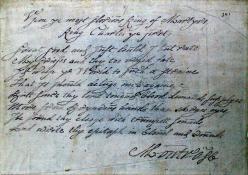James Graham der Dichter
Wie viele gebildete Männer seiner Zeit, war Montrose auch ein Dichter. Dabei bezog er häufig politische Geschehnisse und seine eigenen Grundsätze in seine Gedichte ein. Sein bekanntestes Werk ist wohl "My dear and only Love". Die Zeile "He either fears his fate too much..." ist zu einem geflügelten Wort geworden und wurde am Vorabend des D-Day von Feldmarschall Montgomery den britischen Truppen mit auf den Weg gegeben. Das Gedicht schaffte es im Jahre 2005 in die engere Auswahl der BBC zur Wahl von Schottlands populärsten Gedichten.
My Dear and Only Love
My dear and only Love, I pray
This noble world of thee
Be govern'd by no other sway
But purest monarchy;
For if confusion have a part,
Which virtuous souls abhor,
And hold a synod in thy heart,
I'll never love thee more.
Like Alexander I will reign,
And I will reign alone,
My thoughts shall evermore disdain
A rival on my throne.
He either fears his fate too much,
Or his deserts are small,
That puts it not unto the touch
To win or lose it all.
But I must rule and govern still,
And always give the law,
And have each subject at my will,
And all to stand in awe.
But 'gainst my battery, if I find
Thou shunn'st the prize so sore
As that thou sett'st me up a blind,
I'll never love thee more.
Or in the empire of thy heart,
Where I should solely be
Another do pretend a part
And dares to vie with me;
Or if committees thou erect,
And go on such a score,
I'll sing and laugh at thy neglect,
And never love thee more.
But if thou wilt be constant then,
And faithful of thy word,
I'll make thee glorious by my pen
And famous by my sword:
I'll serve thee in such noble ways
Was never heard before;
I'll crown and deck thee all with bays
And love thee evermore.
Es gibt noch reichlich weitere Strophen, deren Urheberschaft allerdings zweifelhaft ist.
Das Gedicht beruht auf einem zeitgenössischen Lied "My dear and only love take heed", das sich die Melodie mit dem Lied "Chevy Chase" teilt.
Melodie: Chevy Chase
Midi von Lesley Nelson-Burns, Quelle: www.contemplator.com
Aber schon ein in jungen Jahren niedergeschriebenes Sprüchlein lässt erkennen, dass der junge Mann einiges vom Leben erwartet:
I would be high; but that the cedar tree
Is blustered down whilst smaller shrubs go free.
I would be low; but that the lowly grass
Is trampled down by each unworthy ass.
For to be high, my means they will not doe:
And to be low my mind it will not bow.
O Heavens! O Fate! When will you once agree
To reconcile my means, my mind and me?
Seine Zeilen zum Tode von Charles I. zeigen, wohin sein Weg nun führt:
Great, good, and just, could I but rate
My grief, and thy too rigid fate,
I’d weep the world in such a strain
As it should deluge once again.
But since thy loud-tongued blood demands supplies
More from Briareus’ hands than Argus’ eyes,
I’ll sing thine obsequies with trumpet sounds,
And write thine epitaph in blood and wounds.

Und sein "Metrisches Gebet" macht deutlich, dass er am Ende seines Weges angekommen ist:
Let them bestow on ev'ry airth a limb;
Open all my veins, that I may swim
To Thee, my Saviour, in that crimson lake;
Then place my parboil'd head upon a stake,
Scatter my ashes, throw them in the air:
Lord (since Thou know'st where all these atoms are)
I'm hopeful once Thou'lt recollect my dust,
And confident thou'lt raise me with the just.
Deutsche Übersetzungen der Gedichte gibt es in dem Buch "Montrose - Wahrheit sucht keine Winkelzüge"